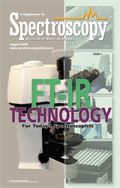Letter from the Editor
Whether used for traditional applications such as identifying counterfeit pharmaceuticals or in some of the more glamorous "CSI-type" forensic applications such as ink analysis, FT-IR technology continues to occupy a large and important space in the field of spectroscopy.
Whether used for traditional applications such as identifying counterfeit pharmaceuticals or in some of the more glamorous "CSI-type" forensic applications such as ink analysis, FT-IR technology continues to occupy a large and important space in the field of spectroscopy. And the fact that many are of the opinion that FT-IR may be nearing maturity can only bode well for its future, as the history of other mature technologies such as gas chromatography attests — being an industry standard for decades to come is good for business, to say the least.

David Walsh
Here in this supplement, Spectroscopy has assembled a collection of some of the newest and most cutting-edge applications of FT-IR spectroscopy in the field today, from thought leaders across the industry. In addition to the applications mentioned above, readers will find research on FT-IR used in the semiconductor industry, FT-IR for polymer research, and more.
In an uncertain marketplace, reliable and established techniques and instrumentation will always thrive, and FT-IR certainly fits this definition. And with application in massive markets such as the pharmaceutical industry and emerging, cutting-edge markets such as forensics, the future is even brighter. Readers can look for more on FT-IR in the September edition of Spectroscopy's e-newsletter, "The Wavelength," as that month's issue is dedicated to this technique. And as always, look for more FT-IR research in the pages of Spectroscopy in the coming months.
Enjoy the issue.

David Walsh
Editor-in-Chief

LIBS Illuminates the Hidden Health Risks of Indoor Welding and Soldering
April 23rd 2025A new dual-spectroscopy approach reveals real-time pollution threats in indoor workspaces. Chinese researchers have pioneered the use of laser-induced breakdown spectroscopy (LIBS) and aerosol mass spectrometry to uncover and monitor harmful heavy metal and dust emissions from soldering and welding in real-time. These complementary tools offer a fast, accurate means to evaluate air quality threats in industrial and indoor environments—where people spend most of their time.
NIR Spectroscopy Explored as Sustainable Approach to Detecting Bovine Mastitis
April 23rd 2025A new study published in Applied Food Research demonstrates that near-infrared spectroscopy (NIRS) can effectively detect subclinical bovine mastitis in milk, offering a fast, non-invasive method to guide targeted antibiotic treatment and support sustainable dairy practices.